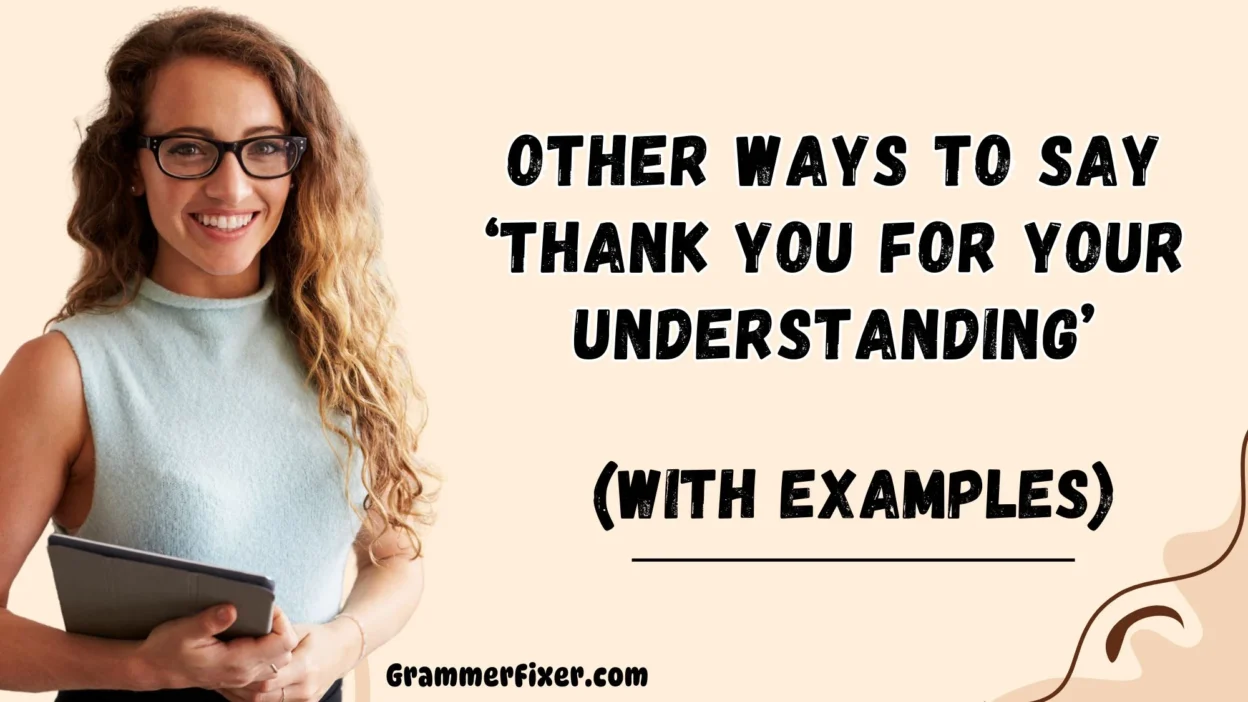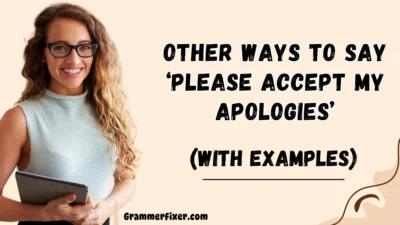Finding the right words to express gratitude can make a world of difference in communication. Saying “thank you for your understanding” is polite, but sometimes a more personal, thoughtful alternative can make your message resonate even deeper.
This guide explores 30 empathetic, professional, and versatile ways to communicate your appreciation, ensuring your message is meaningful, warm, and memorable.
What Does “Thank You for Your Understanding” Mean?
The phrase “thank you for your understanding” is used to acknowledge someone’s patience, flexibility, or consideration when a situation may cause inconvenience, delay, or disruption.
It conveys gratitude and respect for the recipient’s ability to adapt or empathize.
Is It Professional/Polite to Say “Thank You for Your Understanding”?
Yes, it is widely regarded as a polite and professional expression, suitable for email correspondence, workplace communication, client interactions, and personal messages.
It signals that you value the recipient’s time, patience, and empathy.
Advantages and Disadvantages
Advantages:
- Conveys respect and gratitude
- Softens potentially negative news
- Strengthens relationships
Disadvantages:
- Can feel formulaic or overused if repeated frequently
- May come across as impersonal without context or personalization
1. I Appreciate Your Patience
Meaning: Acknowledges the recipient’s willingness to wait or tolerate a situation.
Explanation: Shows gratitude for their time and tolerance.
Scenario Example: “I appreciate your patience while we resolved the technical issue.”
Best Use: When delays or inconveniences occur.
Tone: Polite, sincere, professional
2. Thanks for Bearing With Me
Meaning: Recognizes the recipient’s effort to stay calm or understanding during a challenging time.
Explanation: Informal yet empathetic, suitable for closer colleagues or friendly professional exchanges.
Scenario Example: “Thanks for bearing with me as I sorted out the last-minute changes.”
Best Use: Casual work scenarios, team projects.
Tone: Friendly, appreciative
3. I’m Grateful for Your Flexibility
Meaning: Expresses gratitude for someone’s adaptability.
Explanation: Highlights their willingness to accommodate changes.
Scenario Example: “I’m grateful for your flexibility regarding the updated meeting schedule.”
Best Use: Meetings, project adjustments, deadlines.
Tone: Polished, professional
4. Thank You for Understanding the Situation
Meaning: Direct acknowledgment of comprehension and patience.
Explanation: Reaffirms that the recipient grasps the complexity or challenge.
Scenario Example: “Thank you for understanding the situation with the shipment delay.”
Best Use: Customer service, official correspondence.
Tone: Formal, respectful
5. I Appreciate Your Consideration
Meaning: Shows gratitude for someone thinking about your circumstances.
Explanation: Polite acknowledgment of empathy or thoughtfulness.
Scenario Example: “I appreciate your consideration regarding the urgent request.”
Best Use: Professional emails, HR communication.
Tone: Respectful, professional
6. Thank You for Your Support
Meaning: Expresses gratitude for assistance or backing.
Explanation: Highlights collaborative effort or guidance.
Scenario Example: “Thank you for your support during the transition period.”
Best Use: Teams, mentorship, guidance contexts.
Tone: Warm, professional
7. Thanks for Your Cooperation
Meaning: Acknowledges collaborative effort.
Explanation: Often used when multiple parties work together to resolve an issue.
Scenario Example: “Thanks for your cooperation in completing the inventory update.”
Best Use: Business, operations, cross-team communication.
Tone: Polite, professional
8. I Appreciate Your Understanding
Meaning: Classic form of expressing thanks for empathy.
Explanation: Reinforces gratitude for patience and comprehension.
Scenario Example: “I appreciate your understanding regarding the schedule change.”
Best Use: Email correspondence, formal communication.
Tone: Respectful, sincere
9. Thank You for Your Time
Meaning: Expresses gratitude for the attention someone gave.
Explanation: Acknowledges that their time was valuable.
Scenario Example: “Thank you for your time during the client call today.”
Best Use: Professional meetings, interviews.
Tone: Polite, appreciative
10. Thanks for Your Consideration
Meaning: Shows gratitude for thoughtful reflection.
Explanation: Often used in requests or proposals.
Scenario Example: “Thanks for your consideration of my proposal.”
Best Use: Job applications, formal requests.
Tone: Formal, professional
11. I’m Thankful for Your Understanding
Meaning: Slightly more heartfelt than standard phrasing.
Explanation: Expresses deeper gratitude and acknowledgment.
Scenario Example: “I’m thankful for your understanding while we sorted the delivery issue.”
Best Use: Client communication, empathetic situations.
Tone: Warm, professional
12. Much Appreciated
Meaning: Short, versatile way to show gratitude.
Explanation: Suitable for quick responses or casual messages.
Scenario Example: “Your help with the project is much appreciated.”
Best Use: Emails, text messages, informal professional settings.
Tone: Friendly, straightforward
13. I Value Your Understanding
Meaning: Highlights the importance of the recipient’s empathy.
Explanation: Emphasizes that their understanding makes a difference.
Scenario Example: “I truly value your understanding during this transition.”
Best Use: Professional or semi-formal messages.
Tone: Polished, sincere
14. Thank You for Your Kindness
Meaning: Focuses on the recipient’s thoughtful nature.
Explanation: Adds a personal, heartfelt touch.
Scenario Example: “Thank you for your kindness in handling the scheduling conflict.”
Best Use: Empathetic, personal-professional scenarios.
Tone: Warm, genuine
15. I Appreciate You
Meaning: Simple and versatile acknowledgment.
Explanation: Works across professional and personal contexts, direct and sincere.
Scenario Example: “I appreciate you for stepping in at the last minute.”
Best Use: Informal to semi-formal contexts.
Tone: Personal, friendly
16. Thanks for Being Understanding
Meaning: Casual way to show gratitude for empathy.
Explanation: Suitable for team members, friends, or colleagues.
Scenario Example: “Thanks for being understanding about my late submission.”
Best Use: Informal communication.
Tone: Casual, friendly
17. Your Understanding Means a Lot
Meaning: Highlights the significance of their patience.
Explanation: Adds emotional weight to your thanks.
Scenario Example: “Your understanding means a lot as we work through this issue.”
Best Use: Personal or semi-formal situations.
Tone: Warm, sincere
18. Thank You for Accommodating
Meaning: Expresses gratitude for flexibility.
Explanation: Often used when plans, schedules, or processes are adjusted.
Scenario Example: “Thank you for accommodating my last-minute request.”
Best Use: Professional, customer interactions.
Tone: Polite, appreciative
19. I’m Grateful for Your Patience
Meaning: Similar to #1, but slightly more formal and heartfelt.
Explanation: Shows recognition of their tolerance.
Scenario Example: “I’m grateful for your patience during this system update.”
Best Use: Customer service, professional communication.
Tone: Polished, professional
20. Thank You for Your Cooperation
Meaning: Emphasizes teamwork or collaboration.
Explanation: Ideal when working jointly to resolve issues.
Scenario Example: “Thank you for your cooperation in completing the project on time.”
Best Use: Teams, operations, project work.
Tone: Formal, professional
21. Thanks for Your Attention
Meaning: Expresses appreciation for someone focusing on your message or request.
Explanation: Suitable for emails, memos, or presentations.
Scenario Example: “Thanks for your attention to the updated report.”
Best Use: Professional communication.
Tone: Polite, straightforward
22. I Appreciate Your Assistance
Meaning: Direct thanks for help provided.
Explanation: Can be used for support, guidance, or hands-on help.
Scenario Example: “I appreciate your assistance in resolving the customer complaint.”
Best Use: Professional, collaborative contexts.
Tone: Polite, professional
23. Thank You for Your Effort
Meaning: Recognizes hard work or dedication.
Explanation: Highlights the recipient’s contribution to a task or project.
Scenario Example: “Thank you for your effort in preparing the final presentation.”
Best Use: Teams, project acknowledgment.
Tone: Respectful, encouraging
24. Thanks for Understanding My Situation
Meaning: Adds personalization and context to your thanks.
Explanation: Acknowledges specific circumstances.
Scenario Example: “Thanks for understanding my situation with the sudden travel change.”
Best Use: Personal-professional, empathetic scenarios.
Tone: Sincere, warm
25. Your Patience Is Appreciated
Meaning: Emphasizes the value of waiting or tolerating an issue.
Explanation: Formal alternative with a professional tone.
Scenario Example: “Your patience is appreciated as we complete the system upgrade.”
Best Use: Customer service, email communication.
Tone: Professional, polite
26. Thank You for Bearing the Inconvenience
Meaning: Acknowledges a specific disruption or difficulty.
Explanation: Recognizes the recipient’s grace under less-than-ideal conditions.
Scenario Example: “Thank you for bearing the inconvenience caused by the delayed shipment.”
Best Use: Customer service, formal communication.
Tone: Polite, formal
27. I Appreciate Your Cooperation
Meaning: Similar to #20; emphasizes teamwork.
Explanation: Highlights contribution and support.
Scenario Example: “I appreciate your cooperation in completing the audit promptly.”
Best Use: Workplace and professional projects.
Tone: Polished, professional
28. Thanks for Your Understanding and Support
Meaning: Combines empathy with practical assistance.
Explanation: Expresses holistic gratitude for both comprehension and help.
Scenario Example: “Thanks for your understanding and support during the system transition.”
Best Use: Formal-professional, customer relations.
Tone: Warm, professional
29. I’m Thankful for Your Cooperation
Meaning: Shows gratitude for helpful collaboration.
Explanation: Adds heartfelt emphasis to a professional message.
Scenario Example: “I’m thankful for your cooperation in resolving the client issue.”
Best Use: Teams, projects, cross-departmental work.
Tone: Sincere, polished
30. Thanks for Accommodating My Request
Meaning: Expresses gratitude for flexibility regarding a request.
Explanation: Suitable for both professional and semi-formal situations.
Scenario Example: “Thanks for accommodating my request to change the meeting time.”
Best Use: Office, client, or personal-professional contexts.
Tone: Polite, appreciative
Conclusion
Finding the perfect way to say “thank you for your understanding” strengthens relationships, fosters goodwill, and leaves a lasting impression. Using these alternatives allows you to personalize your messages, reflect sincerity, and adapt to different scenarios—from casual team interactions to formal client communications. Choosing the right words ensures your appreciation is not only communicated but felt, making every gesture of gratitude meaningful.



